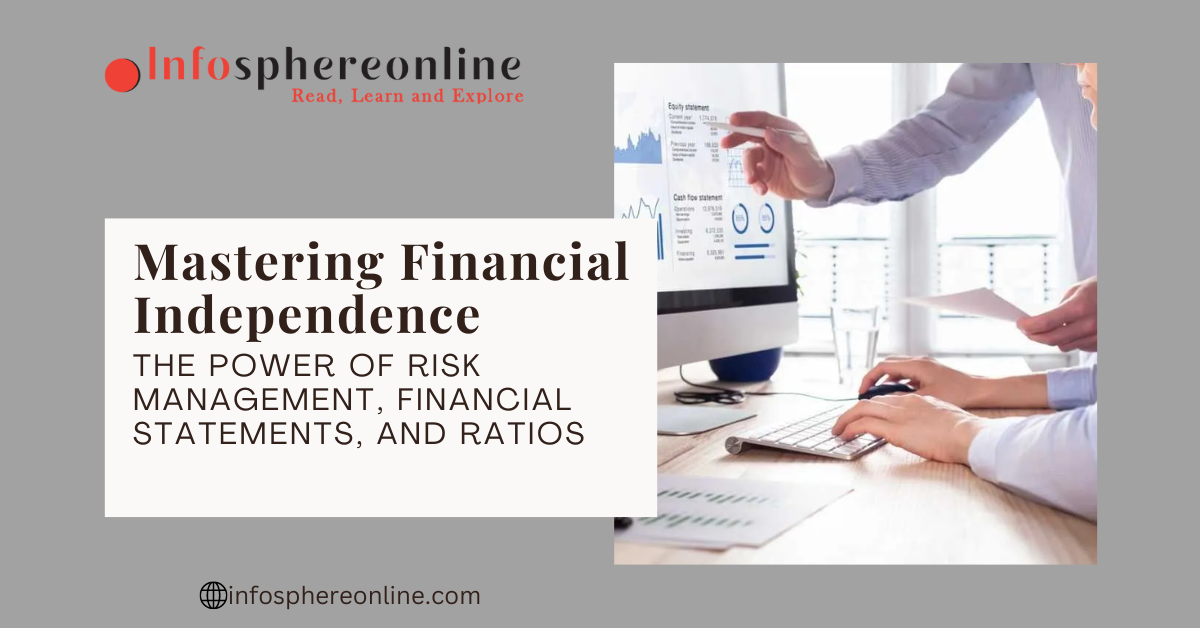Mastering Financial Independence: The Power of Risk Management, Financial Statements, and Ratios
- 89 Views
- Shweta Chauhan
- 27 August 2024
- Personal Finance
Understanding the Path to Financial Independence
Reaching financial autonomy is feasible. To begin with, assess your existing financial situation with Infosphereonline and make a commitment to long-term wealth accumulation. Establish attainable goals and make steady progress toward them. Create a variety of revenue sources to boost profits and offer stability. Invest prudently in a variety of assets, including companies, real estate, and stocks. Learn how to save and budget effectively to build up money for emergencies and investments. Recall that achieving financial independence takes time. To find your way to freedom, exercise patience, self-control, and ongoing personal finance education.
The Crucial Role of Risk Management in Achieving Financial Independence
Being financially independent requires effective risk management. Put in place a thorough plan with Infosphereonline to protect money and provide stability. Invest in a variety of asset types to reduce risk and build a well-rounded portfolio that can withstand market swings. Your financial future is safeguarded by insurance, which covers liability, property, health, and life. Create an emergency fund to cover unforeseen costs. Reduce risks by keeping up with market developments, examining investments on a regular basis, and, if necessary, consulting a specialist. A well-thought-out risk management strategy is necessary to create and maintain wealth.
Overcoming Major Challenges to Financial Independence
To become financially independent, one must overcome the following major obstacles:
1. Handle debt: Make a plan and stick to it to pay off high-interest loans.
2. Prevent lifestyle inflation by allocating extra money to financial objectives.
3. Manage market volatility by keeping an eye on the big picture.
4. Deal with behavioral finance: Acquire knowledge of cognitive biases and make judicious choices.
By using the right tactics to overcome these challenges, you can become financially independent.
Conclusion:
Take the concepts and techniques you’ve studied to take charge of your financial future. Establish precise objectives, make a reasonable spending plan, and make incremental advancements. Whether you’re growing income, decreasing spending, or making prudent investments, make every financial decision matter. Seek advice from financial professionals or other like-minded people. Remain dedicated to your path; perseverance is necessary to achieve financial freedom
—FAQs:
Why is financial independence crucial for long-term success?
Long-term success depends on financial independence since it lays the groundwork for both career and personal development. It facilitates self-investment and calculated risk-taking by allowing decision-making based on goals rather than financial limitations. This independence provides flexibility to increase money and develop skills without financial stress, acting as a safety net against setbacks and downturns in the economy. In the end, it all comes down to giving yourself the freedom to choose how you want to live, support causes, and leave a legacy. Setting financial independence as a top priority can safeguard your future and open the door to long-term success and happiness.
How can effective risk management protect your wealth?
The preservation and expansion of wealth depend heavily on effective risk management. Put in place a plan to safeguard resources and facilitate wise choices. Important elements:
1. Spread your assets over a variety of asset classes, markets, and geographical areas.
2. Insurance: Invest in life, property, and liability protection to safeguard your wealth.
3. Regular portfolio reviews: Adjust investments based on new information.
These procedures offer protection and peace of mind while safeguarding wealth and setting you up for long-term financial success.
What are the key financial statements every investor should understand?
The income statement, balance sheet, and cash flow statement are the three key financial statements that investors need to understand. These records show the performance and financial standing of an organization. Profitability, costs, and revenue are displayed on the income statement. Liquidity and solvency are indicated by the balance sheet, which lists assets, liabilities, and equity. The cash movement in finance, investments, and activities is monitored by the cash flow statement. Investors can make well-informed decisions by evaluating a company’s performance, stability, and development potential by comprehending these assertions.
Can mastering financial concepts really lead to better investment decisions?
Investment decisions are improved by understanding financial concepts. Effective financial navigation requires an understanding of asset allocation, risk management, and diversification. A well-informed investor can avoid making rash decisions by analyzing trends, assessing opportunities, and making well-informed decisions. A strong financial base makes it possible to evaluate recommendations and customized plans critically. Making wise choices is what makes investing successful—not luck. Acquiring knowledge of these ideas contributes to wealth creation and preservation, making it an investment in your financial future.
Recent Posts
- Travel Guide: Family, Culture, Eco-Tourism, and Luxury
- Backpacking Travel vs. Business Travel: Finding the Perfect Balance for Your Adventures
- Must-Try Outfit Ideas Inspired by the Latest Fashion Trends for Every Season
- Essential Parenting Resources for Managing Child Behavior and Overcoming Parenting Challenges
- Mastering Your Financial Goals: Essential Tips for Building an Emergency Fund and Planning for the Future

